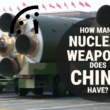In Round One, Sinan Ulgen maintained that nuclear weapons deterred the United States and Soviet Union from engaging in direct conflict during the Cold War. He argued that nuclear weapons can deter future wars as well. Though Wael Al Assad has already taken issue with elements of this argument, I have my own reasons—related, but distinct—for disputing Ulgen's notion that nuclear weapons are irreplaceable in security maintenance.
First, Cold War history does little to prove that nuclear weapons are a stabilizing force. While it is true that the United States and Soviet Union maintained a "cold peace" during the Cold War, it's not necessarily true that nuclear weapons explain this lack of direct conflict. Nor is it a certainty that the two countries would have fought a direct war if they had not had nuclear weapons. So the notion that nuclear weapons are responsible for the cold peace can only be a hypothesis. And according to a theory called the stability-instability paradox, nuclear weapons may make conventional wars more likely. That is, if nations feel safe from strategic retaliation because of their nuclear arsenals, they may be tempted to fight proxy wars or engage in gradual aggression when otherwise they would not do so.
But beyond this, nuclear weapons can easily create a classic security dilemma—a situation in which one nation's efforts to improve its security are perceived as threatening by another nation, leading to heightened tension and perhaps war. Inevitably, countries view their own nuclear weapons and their rivals' weapons in very different ways. Their own weapons, or their allies', are tools for preserving national security. Rivals' weapons are security threats. And though nuclear-armed countries portray their nuclear strategies as deterrence strategies, this does nothing to eliminate the weapons' aggressive potential, or alleviate other nations' concern about that potential. In a nutshell, that's the situation that pertained between the United States and the Soviet Union during the Cold War, and it's the situation that pertains on the Korean peninsula today (even if South Korea has no nuclear weapons of its own).
But even if one accepts the argument that nuclear weapons have had some stabilizing effect in the past, nuclear proliferation holds grave potential for creating instability in the future. Unless nuclear weapons are abolished, more and more countries will go nuclear over time. Some nations will find it very difficult to make sound decisions where strategic stability is concerned—they may be unable to distinguish between manageable conventional conflicts and desperate situations in which use of nuclear weapons could come under consideration. Small conflicts could quickly escalate into nuclear exchanges. In addition, as more and more players are involved, nuclear signaling will become increasingly complex. Misunderstandings and miscalculations will become more likely. The only way to avoid these risks is to abolish nuclear weapons.
Step by step. In both his essays so far, Assad has questioned nuclear weapon states' commitment to disarmament. Frankly, it makes perfect sense that these nations are reluctant to disarm completely. If nuclear weapon states believe that their weapons are useful, important, and (notwithstanding their treaty commitments) legitimate, they will be in no special hurry to eliminate their nuclear arsenals. But nuclear disarmament might proceed more efficiently if it took lessons from chemical weapons disarmament, something to which Assad referred in Round Two.
The 1925 Geneva Protocol banned the use of chemical (and biological) weapons. But many countries reserved the right when they joined the Protocol to retaliate with chemical weapons against a chemical attack. So chemical disarmament essentially began with a no-first-use pledge. Then it proceeded to delegitimization of chemical weapons; then to their devaluation; and finally to total disarmament, a process that is nearly complete today. So it may be more fruitful to place constraints on the use of nuclear weapons than to focus on their absolute numbers.
Topics: Nuclear Weapons
Share: [addthis tool="addthis_inline_share_toolbox"]














